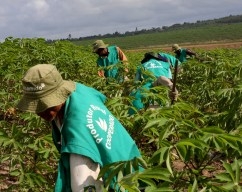Alliance for Development
The Bahia State Manioc Starch Producers’ Cooperative, supported by the Odebrecht Foundation, is inserted into the Starch Cooperative Alliance to promote the leasing of estate-owned land to local farmers
2 de May de 2011
The Bahia State Manioc Starch Producers’ Cooperative, supported by the Odebrecht Foundation, is inserted into the Starch Cooperative Alliance to promote the leasing of estate-owned land to local farmers
2 de May de 2011

Guaranteeing the weekend fair was no easy task for farmer Railton Andrade. At age 22, the manioc root producer saw his life change when he became a member of the Bahia State Manioc Starch Producers’ Cooperative (COOPAMIDO). “Before I worked on one of the few existing lands as a sharecropper and earned very little,” said Andrade, a resident of the municipality of Laje in Bahia. “Today, we have the advantage of working for ourselves and guaranteeing good production and increased profits,” he said.
Founded in 2009, COOPAMIDO has 130 members and plans to increase this number to up to 400 producers by the end of this year. The cooperative corresponds to the extraction industry for the Starch Cooperative Alliance – which also includes the industrial complex Bahiamido (manufacturing industry) and partners and clients (service industry). For Jairo Santos, president of COOPAMIDO, it is the joint work that allows the community to evolve. “The region is the one that wins with this,” said Santos.
The alliance’s proposal is to promote the leasing of estate-owned lands to local farmers. These farmers then use the lands to grow manioc and deliver the roots to COOPAMIDO. Bahiamido uses its processing unit to produce modified starch – used by the food, fine chemicals and oil industries, among others – which is developed with added value for the producer, who sells it.
In this cycle, the cooperative members have revenue that totals 90% to 95% of production and the farmer receives from 5% to 10%. Through the cooperatives, members also have access to new technologies and equipment. “Everything was done manually,” said António dos Santos, a farmer who lives in Conceição do Almeida. “We only produced the flour. Now, we have a machine to help us work,” he said.
The first months of operation of Bahiamido, which began its activities in May of this year, will be dedicated to technical adjustments and experiments. In October, the factory will begin processing the producers’ manioc. “The project represents an important step for making the Bahia economy independent from the ‘import’ of starch from other regions in the country in the future,” said Anselmo Selhorst, Alliance Leader.
The project, supported by the Odebrecht Foundation, seeks to promote the practice of fair and just trade. The goal is to offer COOPAMIDO members a monthly income ranging from R$ 1,200 to R$ 1,500.
The Cooperative Alliance concept has been applied at institutions associated with the Bahia Southern Lowlands Environmental Protection Area Mosaic Integrated and Sustainable Development Program (PDIS), also supported by the Odebrecht Foundation. The innovative model of the Cooperative Alliance seeks to compensate the three economic sectors and create a direct link between the farmer and conscious
consumer. Within this context, the education and training of the next generation becomes an integral and essential part of the initiative.
Partnership
On April 29, some 700 people gathered to participate in the “Morning of Agribusiness” and “Afternoon in the Field” promoted by COOPAMIDO, both held at the Novo Horizonte – Laje Farm, the head site for the Bahiamido project – the first Northeastern industry with the capacity to process 200 tons of manioc per day to produce modified starch.
The occasion was used to sign agreements with EMBRAPA Manioc and Fruit Production, the Bahia National Rural Learning Service and the Laje City Government. There was also the formalization of a new partnership with three farms, totaling over 1,000 hectares, owned by Pedro Antônio Melo. “With the factory, we were able to transfer land for manioc production at a good price,” said Melo. “We also helped the chain organize itself in such a way that everyone can win,” he said. “Now, rural residents will work under formal conditions and this will bring significant changes for the region’s economy,” said Eduardo Salles, Bahia State Secretary of Agriculture, also present at the event.
Do you wish to be
a partner in our projects, make
a donation or hire our technical consulting?
Send a message
right now!